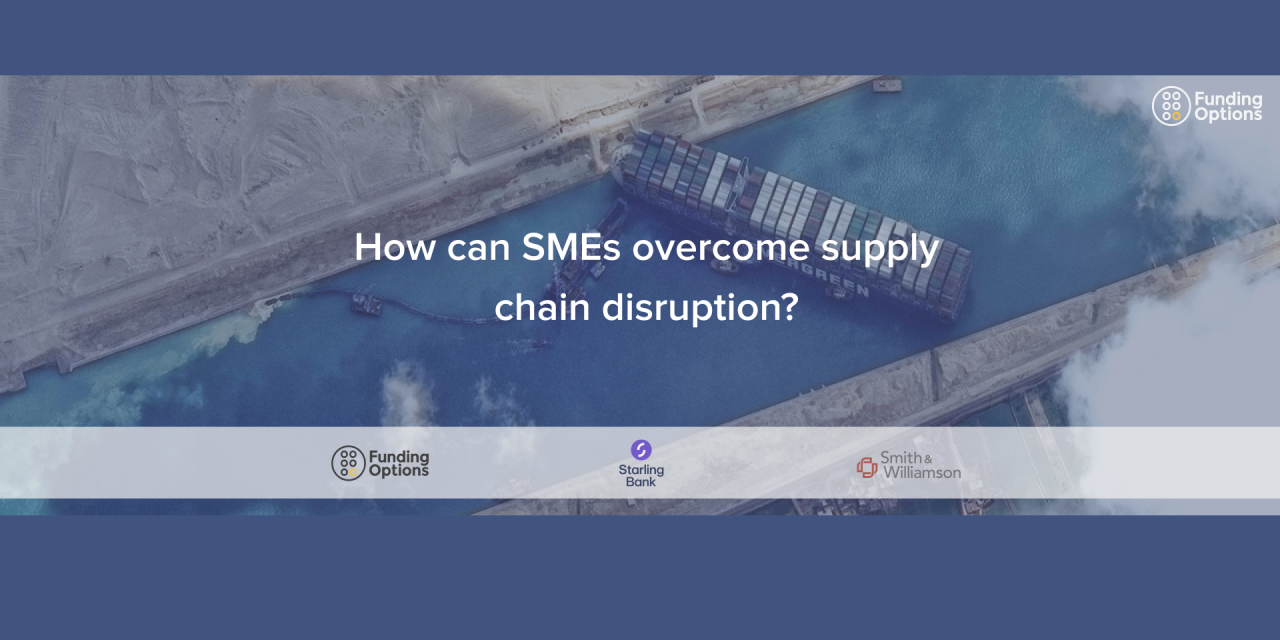Covid-19
How SMEs can mitigate supply chain disruption
17 Feb 2022
In a recent webinar, our Head of Sales, Ryan Hyde-Smith, was joined by Edward Revell from Starling Bank and Hugh Doherty from Smith & Williamson, to discuss how supply chain disruption is impacting UK SMEs. Here, we discuss how businesses can mitigate supply chain challenges through preparation and funding.

Since summer 2021, the widespread disruption to supply chains has dominated the headlines – both in the UK and globally. These supply problems have led to delayed deliveries, higher prices, gaps on supermarket shelves and empty petrol stations.
This impact has been felt across the SME landscape, affecting businesses of all sizes – including Greggs, Ikea and BP who have all reported issues. But despite the relatively recent media coverage, the supply chain issues SMEs face today predate Covid-19.
Watch the webinarWhat’s caused the supply chain crisis?
“There have been long-standing structural issues, particularly in the supply chain,” says Doherty, who points out that there was a shortage of 60,000 HGV drivers the week before Covid hit. Lots of drivers were in the process of retiring, and the sector struggled to hire.
Brexit has accelerated these challenges.
New import and export regulations impacting Customs Declarations, Rules of Origin and Pre-notification have been in play since 1 January 2022.
The new regulations “are going to provide immense pressure for SMEs” in terms of time and resources, adds Doherty. “Processing import and export declarations can cost between £30-60 each, and that’s a significant extra burden.”
Further changes are coming in on 1 April 2022, including safety and security declarations for imports and certification of physical checks for any remaining animal products.
Covid is compounding supply chain issues through staff shortages – many EU citizens who travelled back to their home countries at the beginning of the pandemic haven’t returned.
40% of Funding Options’ customers cite “cash flow” as their primary purpose when it comes to applying for additional funding, says Hyde-Smith. “Working capital requirements are something that businesses need to be very thoughtful of in the current climate,” adds Revell, who has also seen an increase in the need for supply chain funding.
What can businesses do to minimise supply chain disruption?
Review regulations
Assess internal processes
Identify tax relief schemes
Keep tax records up-to-date
“The important thing for business owners is to keep supply chains moving, to make sure no stock gets stuck or spoiled due to delays,” explains Doherty. He also highlights the need for business owners to understand what their obligations are in the short and long term.
If you’re a business owner navigating the new import/export landscape, Doherty suggests speaking to your advisors to get a full understanding of what you need to put in place internally to ensure your business meets the new requirements.
“Work with trade associations – they can help collect knowledge within your sector to understand what the requirements are.”
It’s also important to review any tax relief that’s available on customs duty, through customs authorisations and warehousing, and on stock. Make sure any VAT is reclaimed.
Keeping on top of your admin can also help you maximise cash flow and reduce the costs of moving goods across the border, says Doherty.
“Make sure there’s good tax housekeeping in place. For example, review commodity codes, ensure the right duty rate is applied and make use of quick fixes like the introduction of the postponed import VAT procedures, which allow relief for VAT which doesn’t have to be paid on the door when the goods are imported.”
Could you benefit from extra funding?
During the pandemic, the government has supported UK SMEs through grants, furlough, VAT delays, Eat out to help out and lending schemes such as the BBLS and CBILS.
“The Recovery Loan Scheme is the current scheme,” says Revell. It’s available until the end of June this year and personal guarantees are not permitted for facilities of £250,000 or less.
It’s important for business owners to understand that the RLS is a loan, not a grant, and it must be paid back on commercial terms. As such, RLS customers need to make sure they’re not taking on debt they can’t repay. Applicants need to supply a range of documents, including filed accounts and bank statements. Eligibility criteria applies.
Apply for an RLS loanAs Hyde-Smith highlights, there are a number of funding opportunities available outside the RLS. Options include invoice finance, revolving credit facilities and e-commerce facilities.
Additional finance options include:
Starling Bank sees a lot of customers applying for funding to refinance their existing facilities, according to Revell. Many of these businesses have managed to pivot or perform better over the last six to 12 months, and “want to look at any savings they can make from having a longer term or slightly larger facility to pay one or a number of debts.”
Debt funding can be used as a vehicle to purchase larger stock.
“If it can be shown to be affordable we will absolutely support that,” says Revell. “If the business hasn’t got the stock to sell to their customers they just can’t grow their turnover. So making sure they’re not short of stock is key.”
Businesses who import stock may also want to consider buying in bulk, says Doherty, because it can lead to larger supplier discounts and help secure the business against rising stock costs caused by potential future inflation.
If you’re looking to fund your supply chain or the purchase of stock, see what you could be eligible for today. Getting a quote won’t affect your credit score.
Get fundingSubscribe to our newsletter today
Sign up for the best of Funding Options sent straight to your inbox.
